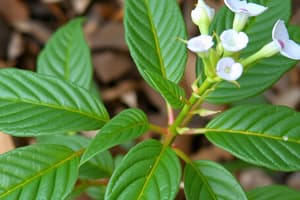Podcast
Questions and Answers
What type of flower possesses both male and female reproductive parts?
What type of flower possesses both male and female reproductive parts?
- Imperfect
- Annual
- Dioecious
- Monoecious (correct)
Which life span category refers to plants that complete their life cycle in one season?
Which life span category refers to plants that complete their life cycle in one season?
- Deciduous
- Biennial
- Perennial
- Annual (correct)
What term describes how leaves are arranged on a stem?
What term describes how leaves are arranged on a stem?
- Leaf complexity
- Phyllotaxy (correct)
- Plant habit
- Leaf morphology
Which type of plant is characterized as having a life span exceeding two seasons?
Which type of plant is characterized as having a life span exceeding two seasons?
What distinguishes a compound leaf from a simple leaf?
What distinguishes a compound leaf from a simple leaf?
What is meant by a plant's life span?
What is meant by a plant's life span?
Which term describes the form of a plant?
Which term describes the form of a plant?
What characterizes perfect flowers?
What characterizes perfect flowers?
What does leaf margin refer to?
What does leaf margin refer to?
In which plant family would you likely find the term 'rhizomes' associated with a perennial life span?
In which plant family would you likely find the term 'rhizomes' associated with a perennial life span?
Flashcards are hidden until you start studying
Study Notes
Objectives
- Familiarize with technical botanical terms for efficient plant description and identification.
- Understand key plant parts, particularly flower anatomy.
Plant Terminology
- Used for plant identification through dichotomous keys, featuring paired questions for classification.
Basic Plant Anatomy
- Life Span: Duration from germination to death (annual, biennial, perennial).
- Life Habit: General form of the plant (herbaceous, woody, moss, tree).
- Leaf Complexity: Distinguishes between simple (one leaf) and compound (multiple leaflets).
- Leaf Arrangement: Refers to the positioning of leaves on the stem (known as phyllotaxy).
- Leaf Morphology: Describes the shape of leaves or leaflets.
- Leaf Margin: Describes the edge of the leaf.
- Leaf Venation: Refers to the arrangement and pattern of veins in leaves.
Applied Example
- Queen's Cup (Clintonia uniflora):
- Life Span: Perennial, utilizing rhizomes.
- Life Habit: Herbaceous, non-woody structure.
- Leaf Complexity: Simple leaves present.
- Leaf Arrangement: Basal arrangement.
- Leaf Morphology: Oblong or elliptic shape.
- Leaf Margin: Entire edge, smooth in texture.
- Leaf Venation: Parallel vein pattern.
Flower Anatomy
- Perfect Flowers: Contain both male (stamens) and female (carpels) reproductive parts.
- Imperfect Flowers: Lack either male or female parts, classified as unisexual.
- Dioecious Plants: Have male and female flowers on separate plants ("2 Houses").
- Monoecious Plants: Have both male and female flowers on the same plant ("1 House").
Life Span Categories
- Annuals: Complete lifecycle in one season.
- Biennials: Take two seasons to complete lifecycle.
- Perennials: Live and reproduce for more than two seasons.
Leaf Arrangement (Phyllotaxy)
- Refers to how leaves or leaflets are organized along the stem, influencing light capture and photosynthesis efficiency.
Leaf Morphology (Shape)
- Familiarize with various leaf shapes; focus on three identifiable types seen in local flora.
Studying That Suits You
Use AI to generate personalized quizzes and flashcards to suit your learning preferences.



